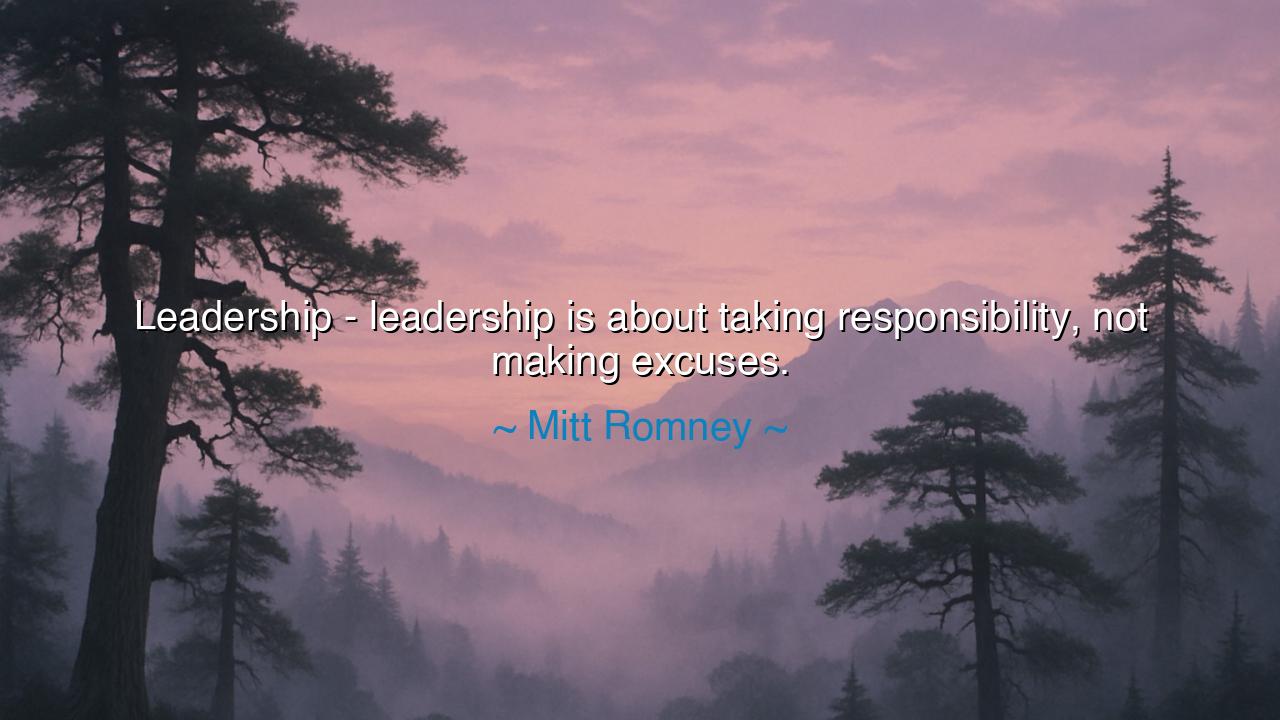
Leadership - leadership is about taking responsibility, not






The words of Mitt Romney, “Leadership—leadership is about taking responsibility, not making excuses,” thunder with the authority of eternal truth. In these words lies the essence of what separates the true leader from the pretender. The weak man looks outward, blaming circumstances, fate, or others for his failings. The true leader looks inward, bearing the weight of his choices, his actions, and even the failures of those he guides. Excuses may protect pride for a moment, but responsibility builds trust that endures for generations.
The ancients themselves knew this well. The Romans revered the general who, even in defeat, stood before the Senate and declared, “The fault is mine.” Such a man might lose a battle, but he gained the honor of his people, for they saw in him courage greater than victory. In contrast, the commander who cast blame upon his soldiers, his allies, or the gods was despised, for his excuses revealed a cowardly heart. Responsibility is the crown of leadership, while excuses are the chains of the powerless.
History provides a shining example in the figure of George Washington. At Valley Forge, his soldiers starved, froze, and muttered of desertion. Washington could have blamed the Continental Congress for failing to supply his army, and indeed their neglect was real. Yet instead, he bore the burden himself, sharing in the hunger, walking among the men, and binding their loyalty with his presence. He did not excuse—he endured, he acted, and by his responsibility, he transformed despair into resolve. It was not excuses that won the Revolution, but responsibility embraced by a leader.
Excuses are the language of fear. They whisper that the world is too harsh, that others are to blame, that nothing can be done. Responsibility, however, is the language of courage. It proclaims that no matter the storm, the leader will stand, will act, will bear the cost if necessary. The difference between the two is the difference between ruin and redemption. For a leader who makes excuses loses the faith of those who follow; but one who accepts responsibility, even in failure, binds the loyalty of their people forever.
The meaning of Romney’s words is stern but liberating. Stern, because they strip away all hiding places. The leader has no refuge in excuses. Liberating, because they grant power: when you take responsibility, you take control. Excuses surrender control to others, to fate, to fortune. Responsibility claims ownership of the future, saying, “I will carry it. I will face it. I will not flee.” And in that act, leadership is born.
The lesson for us is clear: in our own lives, we must cast off the easy refuge of excuses. If we fail, let us admit it. If we falter, let us own it. If others depend on us, let us bear their struggles as our own. Whether in family, in work, or in service to the greater good, the first step to leadership is to say, “The burden is mine.” By doing so, we reveal the strength of our character and the depth of our resolve.
The practical action is this: each day, when confronted by hardship, resist the impulse to explain away failure or blame others. Instead, ask, “What is my responsibility here? What can I do to move forward?” Let your words be few and your actions many. Show others by your steadiness that you are worthy to be followed. And when success comes, share the glory with others; when failure comes, carry the blame yourself. In this way, you will not only lead—you will inspire.
Therefore, O listener, engrave this truth upon your heart: “Leadership is about taking responsibility, not making excuses.” For the world is weary of those who shift blame, but it longs for those who stand firm. Be such a one. Bear the weight with honor, and in time, you will find that others will gladly bear it with you. This is the path of the leader, and it is the path of greatness.






AAdministratorAdministrator
Welcome, honored guests. Please leave a comment, we will respond soon